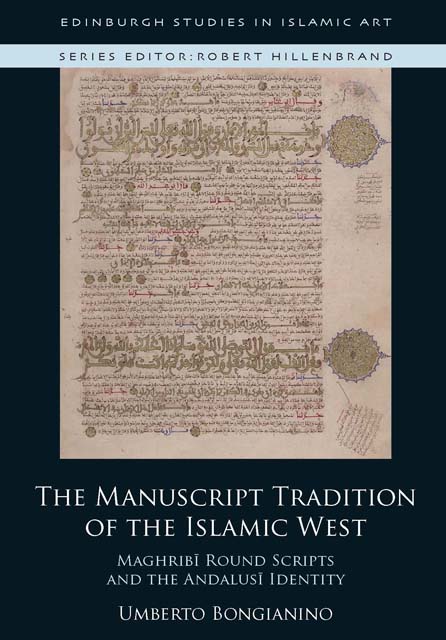Book contents
- Frontmatter
- Contents
- List of Figures
- Acknowledgements
- Note on Transliteration and Translation
- Abbreviations
- Series Editor’s Foreword
- Introduction: A Book about Books
- Chapter One Maghribī Round Scripts: A New Definition
- Chapter Two Maghribī Round Scripts in the Third/Ninth and Fourth/Tenth Centuries
- Chapter Three Maghribī Round Scripts in the Fifth/Eleventh Century
- Chapter Four Maghribī Round Scripts in the Sixth/Twelfth Century
- Chapter Five Beyond Books: Quranic Manuscripts and Chancery Documents
- Conclusion: Inscribed Identities
- I List of Dated Manuscripts
- II Titles and Genres of Dated Manuscripts
- III Copyists of Dated Manuscripts
- IV Places of Copying
- V Remarkable Colophons and Notes
- Glossary
- Bibliography
- Index
Chapter Two - Maghribī Round Scripts in the Third/Ninth and Fourth/Tenth Centuries
Published online by Cambridge University Press: 18 November 2022
- Frontmatter
- Contents
- List of Figures
- Acknowledgements
- Note on Transliteration and Translation
- Abbreviations
- Series Editor’s Foreword
- Introduction: A Book about Books
- Chapter One Maghribī Round Scripts: A New Definition
- Chapter Two Maghribī Round Scripts in the Third/Ninth and Fourth/Tenth Centuries
- Chapter Three Maghribī Round Scripts in the Fifth/Eleventh Century
- Chapter Four Maghribī Round Scripts in the Sixth/Twelfth Century
- Chapter Five Beyond Books: Quranic Manuscripts and Chancery Documents
- Conclusion: Inscribed Identities
- I List of Dated Manuscripts
- II Titles and Genres of Dated Manuscripts
- III Copyists of Dated Manuscripts
- IV Places of Copying
- V Remarkable Colophons and Notes
- Glossary
- Bibliography
- Index
Summary
Book culture and production in Umayyad Iberia
IT HAS LONG since become commonplace to acknowledge that, already in the fourth/tenth century, al-Andalus had equalled, and perhaps even surpassed, Iraq as a flourishing centre of Arabic written culture, a land of passionate bibliophiles and great libraries, a paramount hub for the making and marketing of books. Ibn Khaldūn was among the first historians to draw this comparison, in the chapter of his Muqaddima dedicated to the craft of wirāqa, a blanket term referring to all phases of book production, from the nibbing of the pen to the binding of a codex. ‘In earlier times,’ remarked Ibn Khaldūn, ‘great consideration was given to scholarly writings and official records, and to the way they were copied, bound, and corrected through [a sound] transmission technique and accuracy. […] In the Islamic world, this phenomenon reached tremendous proportions in Iraq and al-Andalus.’ Four centuries before Ibn Khaldūn, as we have seen, the geographer al-Muqaddasī already praised the unmatched skills of the Andalusis in the field of wirāqa. Though he never visited Iberia, al-Muqaddasī must have had access to Andalusī manuscripts, and his remark seems particularly trustworthy in view of his first-hand knowledge of the binder's craft, an activity that he exercised occasionally to raise money for his travels. However, if one excludes this important testimony from the Muslim East, contemporary sources are generally silent on the activity of the Andalusī copyists and bookbinders who lived under the Umayyads of Cordova. To shed some light on the matter, modern scholars have relied mostly on the work of later historiographers: authors such as Ibn Ḥazm (384/994–456/1064), Ibn Ḥayyān (377/987–469/1076), ʿAbd al-Wāḥid al-Marrākushī (581/1185–625/1228), Ibn ʿIdhārī (d. after 712/1312) and al-Maqqarī (d. 1041/1632), who based extensive parts of his compilation on the works of Ibn Ghālib al-Gharnāṭiī (sixth/twelfth century) and Ibn Saʿīd al-Maghribī (seventh/thirteenth century).
Libraries and penmanship
In the wake of Julián Ribera's seminal article Bibliófilos y bibliotecas en la España musulmana (1896), a remarkable number of studies have been published in the past fifty years on the book culture of Umayyad Iberia, and yet none of them has managed to add substantial new elements to our knowledge of the subject.
- Type
- Chapter
- Information
- The Manuscript Tradition of the Islamic WestMaghribi Round Scripts and Andalusi Identity, pp. 72 - 124Publisher: Edinburgh University PressPrint publication year: 2022



